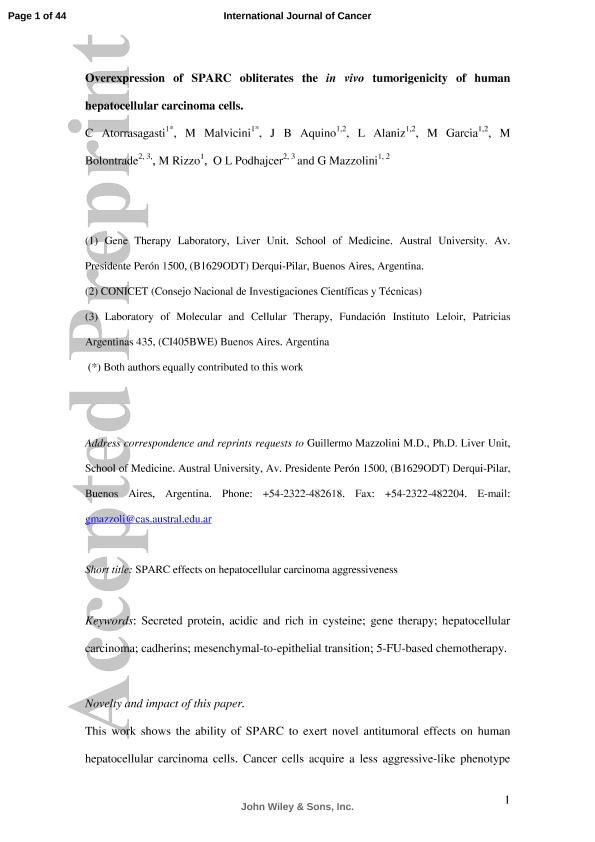Artículo
Overexpression of SPARC obliterates the in vivo tumorigenicity of human hepatocellular carcinoma cells
Atorrasagasti, María Catalina ; Malvicini, Mariana
; Malvicini, Mariana ; Aquino, Jorge Benjamin
; Aquino, Jorge Benjamin ; Alaniz, Laura Daniela
; Alaniz, Laura Daniela ; García, Mariana Gabriela
; García, Mariana Gabriela ; Bolontrade, Marcela Fabiana
; Bolontrade, Marcela Fabiana ; Rizzo, Manglio Miguel
; Rizzo, Manglio Miguel ; Podhajcer, Osvaldo Luis
; Podhajcer, Osvaldo Luis ; Mazzolini Rizzo, Guillermo Daniel
; Mazzolini Rizzo, Guillermo Daniel
 ; Malvicini, Mariana
; Malvicini, Mariana ; Aquino, Jorge Benjamin
; Aquino, Jorge Benjamin ; Alaniz, Laura Daniela
; Alaniz, Laura Daniela ; García, Mariana Gabriela
; García, Mariana Gabriela ; Bolontrade, Marcela Fabiana
; Bolontrade, Marcela Fabiana ; Rizzo, Manglio Miguel
; Rizzo, Manglio Miguel ; Podhajcer, Osvaldo Luis
; Podhajcer, Osvaldo Luis ; Mazzolini Rizzo, Guillermo Daniel
; Mazzolini Rizzo, Guillermo Daniel
Fecha de publicación:
06/2010
Editorial:
Wiley
Revista:
International Journal of Cancer. Journal International du Cancer
ISSN:
0020-7136
e-ISSN:
1097-0215
Idioma:
Inglés
Tipo de recurso:
Artículo publicado
Clasificación temática:
Resumen
Hepatocellular carcinoma (HCC) is the sixth most common cancer and the third leading cause of cancer-related death worldwide. Current treatments are extremely disappointing. SPARC (Secreted protein, acidic and rich in cysteine) is a matricellular glycoprotein with differential expression in several tumors, including HCC, which significance remains unclear. We infected HCC cells (HepG2, Hep3B and Huh7) with an adenovirus expressing SPARC (AdsSPARC) to examine the role of SPARC expression on HCC cells and its effect on tumor aggressiveness. The in vitro HCC cells substrate-dependent proliferation and cell cycle profile were unaffected; however, SPARC overexpression reduced HCC proliferation when cells were grown in spheroids. A mild induction of cellular apoptosis was observed upon SPARC overexpression. SPARC overexpression resulted in spheroid growth inhibition in vitro while no effects were found when recombinant SPARC was exogenously applied. Moreover, the clonogenic and migratory capabilities were largely decreased in SPARC-overexpressing HCC cells, altogether suggesting a less aggressive HCC cell phenotype. Consistently, AdsSPARC-transduced cells showed increased E-cadherin expression and a concomitant decrease in N-cadherin expression. Furthermore, SPARC overexpression was found to reduce HCC cell viability in response to 5-FU-based chemotherapy in vitro, partially through induction of apoptosis. In vivo experiments revealed that SPARC overexpression in HCC cells inhibited their tumorigenic capacity and increased animal survival through a mechanism that partially involves host macrophages. Our data suggest that SPARC overexpression in HCC cells results in a reduced tumorigenicity partially through the induction of mesenchymal-to-epithelial transition (MET). These evidences point to SPARC as a novel target for HCC treatment.
Archivos asociados
Licencia
Identificadores
Colecciones
Articulos(IIBBA)
Articulos de INST.DE INVEST.BIOQUIMICAS DE BS.AS(I)
Articulos de INST.DE INVEST.BIOQUIMICAS DE BS.AS(I)
Citación
Atorrasagasti, María Catalina; Malvicini, Mariana; Aquino, Jorge Benjamin; Alaniz, Laura Daniela; García, Mariana Gabriela; et al.; Overexpression of SPARC obliterates the in vivo tumorigenicity of human hepatocellular carcinoma cells; Wiley; International Journal of Cancer. Journal International du Cancer; 126; 11; 6-2010; 2726-2740
Compartir
Altmétricas



